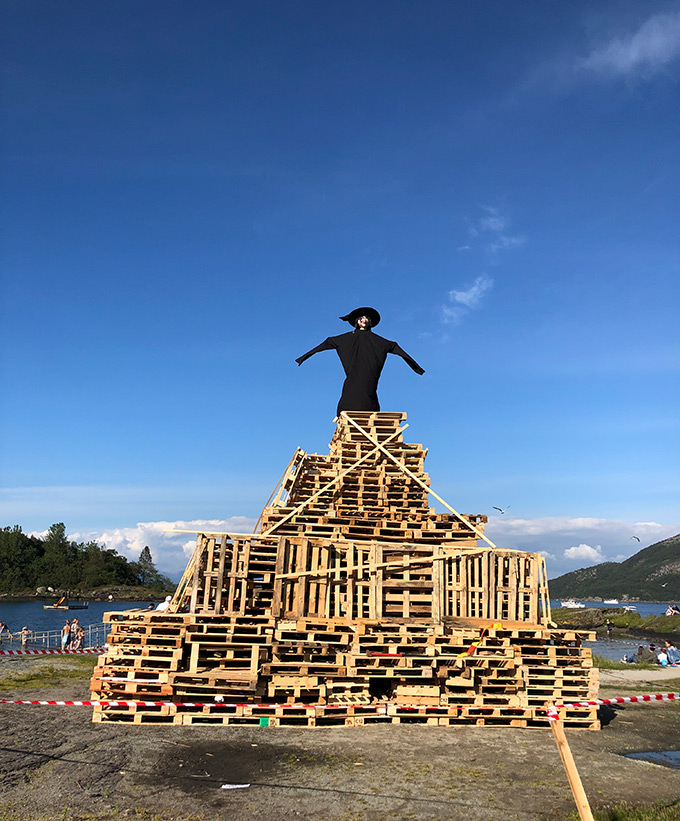The Hunt for St. Hans Celebrations

Our family evening is turning into a hunt. My husband is not impressed; after 15 years of marriage I can usually tell when he thinks I'm being overly dramatic. Like now. I have insisted that we leave our local beach where we had planned to celebrate St. Hans, because there is no public bonfire. So, instead of sitting peacefully on a picnic blanket, beer in hand, he is being dragged back to the car, googling 'shortest distance to Stavanger St. Hans bonfire' as he walks.
I get it; a picnic blanket and a drink sounds delightful, but the children have never experienced St. Hans in Norway and I really want them to see a proper bonfire. I'm sure the hunt will be worth it. I stuff everyone back in the car and we're off. Again.
Arriving at Vaulen beach, 15 minutes and a steep 250 NoK entrance fee later, I am so pleased with my decision I only just manage not to utter the killer of all marital bliss, 'I told you so!'
Heaps of people have gathered at the beach. The temperature is balmy, the sea flat and a band is playing catchy family friendly music. I try to pass it off as 'blues' to cheer up my still-not-quite convinced husband but he has procured a cup of luke warm coffee and seems to be enjoying himself, 'blues' or no 'blues', because this is Scandinavian summer at its best.

In the middle of a field is the tallest bonfire I've ever seen, complete with a witch rag-doll ties to the top, waiting to be lit. The kids are gratifyingly impressed, but not surpringly, they want to know what this is all about. 'What is St. Hans?' 'What's with the doll?' 'I love the bonfire - but why?'

What is St. Hans?
Hans, in this case, refers to John the Baptist. His birthday, apparently, is June 24th. The day is also known as jonsok, jonsmesse and jons vake, vake meaning to be awake, watching and waiting for something to happen.
While the birth of John the Baptist was June 24th, we tend to celebrate the eve of June 23rd - presumably, the evening people stayed awake to wait for the birth of John. I can't say I've ever experienced a St. Hans celebration with religious elements, but it is of course entirely possible that my atheist conviction is to blame for that.
It has been suggested, https://norge.sandalsand.net/hvorfor-og-hvordan-feirer-vi-st-hans/ that St. Hans may have been an attempt by the church to ascribe religious meaning to a pre-Christian ritual, and that the St. Hans celebrations of today is less 'celebration of John the Baptist' and more 'mishmash of several things,' since many of the rituals we associate with St. Hans originate in pre-Christian times.
Summer Solstice and The Night of the Withces
While there seem to be regional differences with regards to what and how, exactly, happens, three elements are wide-ranging:
- celebration of the summer solstice, sunshine, light and fertility
- midsummer as an especially magical, potent night
- protection against evil
The summer solstice, June 21st, marks the longest day of the year. In a country that finds itself plunged into (semi)darkness through a long winter, the celebration of new beginnings, growth, light, sunshine and endless evenings is unsurprising.
Traditionally, I am told, there was more emphasis on the passing of the year, fertility and the crop that was to come. Plants used in natural medicine was believed to be especially potent on this evening, and some say that girls could leave flowers under their pillow to find out who they'd marry. While my own daughters didnt' much care for the marriage theory, they were more than happy to wear a traditional (magical?) floral wreath.
In 'the olden days' (my son's description of everything prior to 1980) it was believed that flames held the power to cleanse and protect against evil, says Arnulf Hodne with the University of Oslo. Midsummer night was 'the night of the witches' - an especially powerful night where withes gathered and collected ingredients, also especially potent on this night, for potions. A fire was lit to protect people, animals and the crop against all evil.
Today, St. Hans is perhaps less magic and more merry - a wonderful family day where people get together to enjoy the bonfire, sunshine and light; fun and games; good food, drinks and music.

Is it Still Important?
Some seem to think the importance and popularity of St. Hans is slowly fading. Indeed, some of the traditions relating to celebrating fertility and growth may be on the wane; I understand 'waking up the soil' https://norge.sandalsand.net/hvorfor-og-hvordan-feirer-vi-st-hans/ in the form of pulling out straws and singing, as well as 'child marriage', still common when my husband was a child in Voss, are loosing their importance.
I shall, however, be bitterly disappointed to see a jolly family party celebrating light, sunshine, the passing of another year and the resistance to and fight against evil - in any form - come to an end.